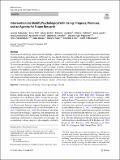| dc.contributor.author | Kubzansky, Laura D. | |
| dc.contributor.author | Kim, Eric S. | |
| dc.contributor.author | Boehm, Julia K. | |
| dc.contributor.author | Davidson, Richard J. | |
| dc.contributor.author | Huffman, Jeffrey C. | |
| dc.contributor.author | Loucks, Eric B. | |
| dc.contributor.author | Lyubomirsky, Sonja | |
| dc.contributor.author | Picard, Rosalind W. | |
| dc.contributor.author | Schueller, Stephen M. | |
| dc.contributor.author | Trudel-Fitzgerald, Claudia | |
| dc.contributor.author | VanderWeele, Tyler J. | |
| dc.contributor.author | Warran, Katey | |
| dc.contributor.author | Yeager, David S. | |
| dc.contributor.author | Yeh, Charlotte S. | |
| dc.contributor.author | Moskowitz, Judith T. | |
| dc.date.accessioned | 2023-03-06T18:44:56Z | |
| dc.date.available | 2023-03-06T18:44:56Z | |
| dc.date.issued | 2023-03-03 | |
| dc.identifier.uri | https://hdl.handle.net/1721.1/148376 | |
| dc.description.abstract | Abstract
Psychological well-being, characterized by feelings, cognitions, and strategies that are associated with positive functioning (including hedonic and eudaimonic well-being), has been linked with better physical health and greater longevity. Importantly, psychological well-being can be strengthened with interventions, providing a strategy for improving population health. But are the effects of well-being interventions meaningful, durable, and scalable enough to improve health at a population-level? To assess this possibility, a cross-disciplinary group of scholars convened to review current knowledge and develop a research agenda. Here we summarize and build on the key insights from this convening, which were: (1) existing interventions should continue to be adapted to achieve a large-enough effect to result in downstream improvements in psychological functioning and health, (2) research should determine the durability of interventions needed to drive population-level and lasting changes, (3) a shift from individual-level care and treatment to a public-health model of population-level prevention is needed and will require new infrastructure that can deliver interventions at scale, (4) interventions should be accessible and effective in racially, ethnically, and geographically diverse samples. A discussion examining the key future research questions follows. | en_US |
| dc.publisher | Springer International Publishing | en_US |
| dc.relation.isversionof | https://doi.org/10.1007/s42761-022-00167-w | en_US |
| dc.rights | Creative Commons Attribution | en_US |
| dc.rights.uri | https://creativecommons.org/licenses/by/4.0/ | en_US |
| dc.source | Springer International Publishing | en_US |
| dc.title | Interventions to Modify Psychological Well-Being: Progress, Promises, and an Agenda for Future Research | en_US |
| dc.type | Article | en_US |
| dc.identifier.citation | Kubzansky, Laura D., Kim, Eric S., Boehm, Julia K., Davidson, Richard J., Huffman, Jeffrey C. et al. 2023. "Interventions to Modify Psychological Well-Being: Progress, Promises, and an Agenda for Future Research." | |
| dc.contributor.department | Massachusetts Institute of Technology. Media Laboratory | |
| dc.identifier.mitlicense | PUBLISHER_CC | |
| dc.eprint.version | Final published version | en_US |
| dc.type.uri | http://purl.org/eprint/type/JournalArticle | en_US |
| eprint.status | http://purl.org/eprint/status/PeerReviewed | en_US |
| dc.date.updated | 2023-03-05T04:08:35Z | |
| dc.language.rfc3066 | en | |
| dc.rights.holder | The Author(s) | |
| dspace.embargo.terms | N | |
| dspace.date.submission | 2023-03-05T04:08:35Z | |
| mit.license | PUBLISHER_CC | |
| mit.metadata.status | Authority Work and Publication Information Needed | en_US |
